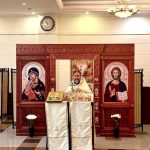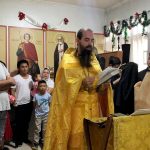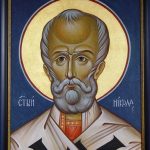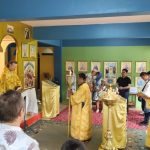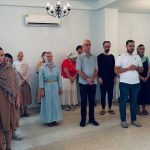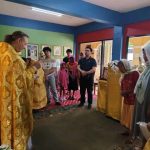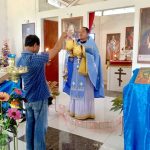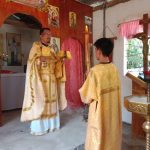May 2 is the day of memory of the people’s favorite Saint blessed Matrona of Moscow (Nikonova). Mother Matronushka, as the faithful affectionately call her, is prayed for in illnesses, life’s troubles, when it does not get along with work, school, housing, and under persecution. The fame of Mother Matrona has long crossed the borders of Moscow, and indeed of all Russia. Thousands and thousands come to the capital to visit the relics of the Saint, in search of help and intercession and many receive her assistance! The Shrine with her relics is in the Pokrovsky monastery.
Stories about miracles that occurred through the Saint’s prayer have long been published in separate books. Matronushka was born in 1885 in Tula province, and passed to the Lord on May 2, 1952 in Moscow.
A poor peasant family, the Nikonovs were already growing 3 children, and the mother, afraid that she would not be able to feed one more child, decided to give it to an orphanage after birth – there was no question of killing the child in the womb. But shortly before giving birth, she dreamed of her unborn daughter in the form of a wonderful white bird – with a human face and closed eyes. The bird landed on the woman’s right hand. God-fearing Natalia regarded the dream as a sign and gave up the idea of shelter. The girl was born blind, and the child had no eyes at all, the eye sockets were closed with tightly closed eyelids – like a white bird that the mother saw in a dream. Soon it was discovered that the blind girl was given a “spiritual” vision, linked with the gift of foresight, miracle-working and healing.
From an early age, Matrona was rarely seen playing in the courtyard with other children, but she often visited the temple and spent almost all her time in prayer, at the icons. Children had violent games: they whipped the blind girl with nettles, knowing that she would not respond to the offender. Or they put her in a hole and laughed as she tried to get out of it. The helpless child was bullied because she behaved strangely: she said things incomprehensible, such as are not expected from a child. However, the neighbors soon noticed that the blind, helpless girl is not only surprisingly astute, but also has the gift of foresight. Moreover, Matrona predicted not only events from the life of her native village, or nearby villages, but in an allegorical form, she prophesied about the fate of the Royal family, the whole of Russia. Unfortunately, all these prophecies were fulfilled.
Having heard about the girl’s foresight, they reached out to the Nikonov house for advice and help, so Matrona turned from a burden into the main breadwinner of the family. At the same time, the blind girl discovered the gift of healing.
When Matronushka was seventeen years old, the girl suffered a misfortune – her legs got paralyzed, and for the rest of her days, the blessed one remained sedentary and completely dependent on others. In 1925, Matronushka moved to Moscow. The fact is that Matrona’s older brothers, who joined the Communist party, were afraid that the presence of the blessed one in their house, to whom people flocked all day long, would cause reprisals from the authorities. Feeling sorry for the old people-parents and brothers, Matrona leaves her native home. Matronushka begins a long period of homelessness. She never had a corner of her own in the capital – she wandered around relatives, acquaintances, some poor houses and basements.
An eyewitness of her life once found this picture: Matronushka was lying with her face to the wall and could not turn around – during the night her hair froze to the wall. Without a residence permit, Matrona many times, literally by miracle, avoided arrest, moving out of other people’s apartments shortly before police came for her.
They told how once a policeman came for Matronushka, and she said to him: “Run home quickly, I, blind and not walking, will not get away from you, and you have trouble at home! Run, or you won’t have time!” The policeman obeyed, ran home, and there his wife was burned by kerogaz: barely managed to get to the hospital. When the policeman was asked the next day why he did not arrest the blind woman, he replied that he would not follow her – “because if it were not for this blind woman, I would have been left without a wife.”
In Moscow of that period there were many unhappy, lost, and sick people. Having heard about the blessed one, many went to her for help, and received it. Matronushka received up to forty people a day. During the war, she was approached not only for healing, but also by those who wanted to learn about the fate of their loved ones. Completely illiterate, she seemed to know everything.
Outwardly, the Matrona’s life was monotonous, devoid of the pathos of the feat – she received people during the day, and prayed at night. Like many ascetics, the blessed one never really went to sleep – more often she just dozed, lying on her side, on her fist. With tiny, as if children’s hands and feet, sitting on a bed or chest, with a kind, bright face and a gentle voice-this Matronushka was remembered by people. She herself was in great pain, and seemed to know neither fatigue nor annoyance. It is easy to love when you are doing well, and you are ready to share your joy with both near and far. But how difficult it is not even to love, but just to tolerate others if something in your life does not add up or you are ill. One can only guess what it cost Matronushka to receive the sick and suffering from day to day, and not just to accept, but to listen and give advice. Matronushka could embrace those who came to her with such love that this alone healed them. In other words, there was so much love in her that, as a sufferer herself, she found the strength to pity others.
How can you learn to love like that?
Once, in a conversation with the blessed one, someone, justifying his intemperance, said: “Mother, it’s all nerves.” “What nerves: in war and in prison there are no nerves… You must control yourself, endure.” Or even for our edification: “If the old, the sick, or those who are out of their minds will say something unpleasant or offensive to you, then do not listen to them, do not get annoyed, but just help them.”
M. Gorodova
Thomas Sunday
“Until I see it, I won’t believe it!- Blessed are they who have not seen, but have believed!”
These are catch phrases from the gospel story about the unbelieving Apostle Thomas, the story which was supposed to convince doubters of the truth of the Resurrection of Christ.
However, a proud person believes only what he wants to believe. If he does not want to think about the afterlife (so as not to change his priorities), then he will not believe the risen from the dead. Therefore, the risen Lord never appeared to his persecutors, but He appeared to Thomas – because he wanted to believe that He was alive! Thomas himself was ready to die for Him: “let us go and die with Him” (John 11: 16). Sent to preach, he went the farthest – even to India. There he was employed by the king to build a Palace, he took a large advance, but spent all the money on beggars. When the king found out his money gone, he put him in prison, considering how to execute him. But the king’s dead brother appeared to the king at night and told him what a magnificent Palace Thomas had built for him in the Heaven. Then the king believed and was baptized with his people.
Through the Apostle Thomas, the Church made sure in the resurrection of the Mother of God, when for him, who was late, the disciples came to the tomb, but instead of Her dead body, saw Her risen.
Christ is risen!
Paschal message from Mindanao
PASCHAL MESSAGE TO HONORABLE CLERGY, VENERABLE MONASTICS AND GOD-LOVING FLOCK OF THE PHILIPPINE – VIETNAMESE DIOCESE BY METROPOLITAN PAVEL OF MANILA AND HANOI
“…Christ is a new Passover, a living Sacrifice,
Lamb of God, who takes away the sins of the world.”
(Chorus of the Easter Canon)
Beloved in the Risen Christ, honorable fathers,
God-loving monastics,
dear brothers and sisters!
The many-merciful Lord, in his unspeakable love for humanity, has again vouchsafed us to reach the great and saving day of the Passover of Christ. From the fullness of my heart, filled with Paschal joy, I bring to each of you a life-giving, unquenchable apostolic greeting that shines through the ages:
CHRIST IS RISEN!
All the Holy Evangelists tell about the Resurrection of Christ. According to the Apostle Matthew’s Gospel, the angel of the Lord says to the myrrh-bearing women: fear not ye, for I know that ye seek Jesus which was crucified; He is not here: for He is risen, as He said. Come, see the place where the Lord lay. And go quickly, and tell His disciples that He is risen from the dead; and, behold, He goeth before you into Galilee… And as they went to tell His disciples, behold, Jesus met them, saying, All hail! (Mt 28: 5-7, 9).
On this named and Holy day, we perceive with a special feeling the truth about the crushing of the enmity that divides humanity by the Crucified and Risen Christ (Eph. 2, 14-16), and we listen to the heartfelt Catechism of John Chrysostom, in which the great Saint speaks of Easter as a source of reconciliation and a pledge of peace.
On this Holy and luminous Easter night, the heart of an Orthodox person rejoices, the Resurrection of Christ is the Foundation of our faith, for, according to the word of the Apostle Paul, if Christ be not risen, then is our preaching vain, and your faith is also vain (1 Corinthians 15:14).
But Christ is Risen! And this is what we proclaim on this Holy and named day to all people and to all living beings on earth today: Christ is truly Risen!
“Truly celebrates the Resurrection the one who has risen from dead works, for deeds of virtue, for faith and Christian love,” –St. John of Kronstadt said.
Therefore, on the Holy Paschal days, celebrating the Resurrection of Christ, let us do works of charity, with a comforting word and compassionate love, to help the sick, the needy and the destitute.
The famous modern theologian and preacher Metropolitan Anthony of Surozh famously said this: “This is our calling: where it is dark, we must be light; where there is no faith – we must bring the assurance of faith; where there is no hope, we must shine with hope, when it would seem impossible to hope; where love is extinguished – we must be invincible love! We should be an example of what a real living person is, a person who is a living image of the Savior Christ, united with God inseparably and giving himself irrevocably to the service of other people!»
My dear brothers and sisters, let us succeed in fulfilling the precepts of the Orthodox faith, which is an abundant source of moral improvement, piety, love, diligence, and peace, guiding us to eternal salvation.
Our message today will once again be the words that I address to you in celebration of the feast, amazing in their power and exalted in their content and meaning:
CHRIST IS RISEN! TRULY HE IS RISEN!
By the grace of God,
Metropolitan Pavel of Manila and Hanoi
Easter, 2020
Manila
PASCHAL GREETINGS of the Metropolitan of Singapore and South East Asia SERGIY to the Most Reverend bishops, clergy, and all God-loving flock of the Patriarchal Exarchate of South East Asia
Most Reverend brethren archpastors, venerable priests, deacons, and beloved brothers and sisters!
CHRIST IS RISEN!
Beloved, I heartily congratulate all of you, on the great and luminous feast of the Holy Pascha!
Today we are spiritually experiencing an event that has the most important significance not only on the scale of world history, but also for the life of each of us. The only begotten Son of God became incarnate and shares our burdens of earthly being, teaches us heavenly truths and, having suffered torments, died on the Cross. For many millennia since the fall of the first people from the Creator, man experienced the tragedy of disunity, but no human effort was able to overcome this abyss of sin. Yet God Himself comes to earth and sacrifices Himself for the salvation of many.
When the myrrh-bearing women and the Saviour’s disciples came to the burial cave and did not find the body of the beloved Master, they first experienced loss and confusion. They did not dare to believe in the reality of the miracle that had happened – what happened seemed so incredible to them. But soon the darkness of doubt cleared, and embarrassment gave way to great joy and great gratitude to God. He is not here: for He is risen, as He said! (Matt. 28: 6) Where until recently their aspirations and hopes were buried, sprouts of warm, sincere faith sprang up and the beauty of sacrificing and the immeasurable depth of Divine love for people revealed. Death – the main and inexorable enemy of man – was finally defeated – it could not keep the Creator and the Source of Life captive!
This is the victory that overcomes the world — our faith (1 John 5: 4), – the Apostle John testifies. What are these unusual words about? They are about the power of the Gospel that surpasses all understanding. This unique power lies in two simple words of Paschal greeting. It is in them – the main content of our faith, a solid foundation of hope and an inexhaustible source of love. Through His glorious Resurrection, Christ opened the door to eternal life for us and granted true spiritual freedom: the freedom that we should be called children of God (1 John 3:1).
Each person is infinitely precious in the eyes of the Lord. Testifying of this, the Saviour walked into the world and transfigured it with works of love and mercy; healed the sick, encouraged the mourners, extended a helping hand to the stumbled. So it is for us, if we want to be truly Christ’s, it is necessary to do the work of Christ, imitating Him in the sacrificial service to our neighbours, because only by works faith was made perfect (James 2: 22). The Lord, Who knows the full depth of human pain, is always with those who are in trouble. And we, by the commandment of the Saviour, are called to see Christ in every neighbour (Matthew 25: 40).
He who lives in the Spirit also has in himself the fruits of the Spirit: love, joy, peace, longsuffering, gentleness, goodness, faith, meekness, temperance (Gal. 5: 22-23). A vivid image of such an evangelical life was revealed by the great ascetic of the last century, St. John the Wonderworker, Archbishop of Shanghai and San Francisco. With an open and courageous heart, he came to the sick and helped those in need, prayed for the afflicted and sought to console those who mourn. Let the example of his struggle be a useful edification for all of us, especially during this difficult time, when the Lord has visited the nations with a dangerous disease.
Our Church life must be full of responsibility. Participation in the Holy Eucharist is the most important action of a Christian: when we partake of the Divine Body and Blood of the Saviour, we let the Lord into us – in Him our weakness becomes a real power that can transform the world. We only need to let Christ to act. But just like “from contact with the fire either ashes or steel is obtained, depending on what is touched. So too does it happen with a man, and everything depends on what he brings to the divine Fire – in what state he touches God. If he keeps himself like iron, the power of the iron becomes steel. If he lets himself go to the point of the weakness of chaff – he will burn up.” (St. John, Archbishop of Shanghai. God is a Consuming Fire).
May, through the prayers of St. John the Wonderworker, Archbishop of Shanghai, our faith which worketh by love (Gal. 5, 6), be strengthened like steel and become a lamp to the world, so that people, seeing our good works and glorify your Father in heaven (Matt. 5 , 16).
Not in all circumstances we are able to openly testify of the Resurrected Saviour, but our everyday Christianity must always be visible, significant and active. Such a testimony, full of the spirit of love for neighbours and true joy in God, when we experience the reality of the Pascha miracle, sounds louder and more convincing than many beautiful and right words.
May the life-giving light of the Resurrection of Christ shine indefinitely in our hearts, illumine and comfort our near and distant. Congratulating all of you once again, beloved, on the great feast of Pascha, I wish you generous mercies from Saviour, Who has risen from the Tomb. The grace of our Lord Jesus Christ, and the love of God the Father, and the communion of the Holy Spirit be with you all.
TRULY CHRIST IS RISEN!
Metropolitan of Singapore and South East Asia,
Patriarchal Exarch of South East Asia
Pascha of Christ
2020
Paschal Greetings of Patriarch KIRILL of Moscow and All Russia to the Archpastors, Pastors, Deacons, Monastics and All the Faithful Children of the Russian Orthodox Church
Your Graces the archpastors, venerable fathers,
all-honourable monks and nuns, dear brothers and sisters:
CHRIST IS RISEN!
By the grace of the All-Generous God, we have been vouchsafed to come to the radiant Paschal night and once again rejoice in the glorious Resurrection of Christ. From the depths of my heart I greet all of you, my beloved, with this great holiday and “feast of feasts.”
Almost two thousand years separate us from the event we recall today. And yet, every year with unchanging spiritual awe the Church celebrates the Resurrection of the Lord, tirelessly bearing witness to the exceptional nature of what occurred in the burial chamber by the walls of ancient Jerusalem.
The whole earthly path of the Son of God – from His miraculous Incarnation to His Passion and terrible death on the cross – is the fulfillment of the Maker’s promise, once given to our forefathers. God promised to send into the world the One who “bears our infirmities and carries our diseases” (Is. 53:4) and who will “save his people from their sins” (Mt. 1:21). Many times the Lord affirmed this promise through His prophets. He remained true to this vow even when the chosen people rejected the covenant and violated the Creator’s will.
It is, then, in the Resurrection of Christ that God’s love is revealed in its fullness, for death has finally been vanquished – the last boundary separating the human person from the true Fount of life. And although death continues to exist in the physical sense and takes away our human bodies, it no longer has the power to destroy our souls, that is to say, to deny us life everlasting in communion with the Maker. Death has been defeated and its sting has been removed (cf. 1 Cor. 15:55). The Lord has made “captivity itself a captive” (Eph. 4:8) and cast down Hades. “Nothing will be impossible with God” (Lk. 1:37), for truly “he is risen, as he said” (Mt. 28:6)!
In the current year the peoples of the earth have been enduring extraordinary ordeals. A baneful epidemic has spread throughout the whole world and has come to our lands too. The authorities have introduced restrictions in order to avert a further rapid spread of the epidemic. In some countries of the Moscow Patriarchate’s pastoral responsibility public worship, including the celebration of the Divine Liturgy, has been suspended. However, we Orthodox Christians are not to be despondent or to despair in these difficult circumstances; even more so we should not surrender to panic. We are called upon to preserve our inner peace and recall the words of the Saviour spoken on the eve of his redemptive Passion: “In the world you face sorrow. But take courage; I have conquered the world!” (Jn. 16:33).
Pascha has become for all of humanity the transition from enslavement to sin to the freedom of the kingdom of heaven, “the freedom of the glory of the children of God” (Rm. 8:21). It is only thanks to the Saviour’s Resurrection that we obtain the true freedom of which the all-praised Apostle Paul speaks, calling upon us to “stand fast… in the liberty wherewith Christ has made us” (Gal 5.1). How many times have we read or heard these words? And now we have to think hard on whether we live today as though Christ’s Resurrection never happened. Are we not in danger of exchanging the riches of eternity for never-ending worldly concerns in once more being held captive to the vanity of this world, in surrendering to transient fears and forgetting the incorrupt spiritual treasures and true calling of the Christian to “serve the Lord in holiness and righteousness before him” (Lk. 1:75)?
And yet, “pure religion and undefiled before God and the Father” (Jm. 1:27) is this: to treat each other with love and patience, to help and support one another in tribulations, following the example of the Good Shepherd shown to us in the Gospel. No outward restrictions should ever tear apart our unity and take away from us the true spiritual freedom which we have obtained through coming to know our Lord and Saviour Jesus Christ Who has conquered death and granted to us the chance to “be called the children of God; for that is what we are” (1 Jn. 3:1).
All the faithful children of the Church are of “one heart and one soul” (Acts 4:32), for apart we are but members, while together we are the Body of Christ and nothing in all creation “shall be able to separate us from the love of God” (Rm. 8:39). Therefore, let those who today are unable for objective reasons to come to church and pray know that they are in other people’s thoughts and prayers. Faith grants to us the strength to live and overcome with God’s help all sorts of infirmities and tribulations, including that which has become a part of our lives through the spread of the dangerous virus.
I ardently call upon all of you, my beloved, to strengthen your common prayer to the Lord so that we may, in spite of all hardships, remain partakers of the grace-filled liturgical life of the Church, so that the holy sacrament of Eucharist may be celebrated and the faithful may with boldness draw near to the Fount of Life which are the Holy Mysteries of Christ, and so that the sick may receive healing and the healthy be protected from the dangerous infection.
We believe that the Risen Saviour will never forsake us and that He will send down upon us the resolve and courage to stand steadfastly in faith and to make our salvific journey through our earthly life to life everlasting.
I wholeheartedly congratulate all of you, my beloved brothers and sisters, on the bright feast of the Holy Pascha and call upon you to always be the image of the Saviour’s true disciples in setting a good example to people around you and in proclaiming the mighty acts of the One “who has called you out of darkness into his marvellous light” (1 Pt. 2:9), so that all the days of our life we may through our deeds testify to the unsurpassed power and truth of the Paschal greeting:
TRULY CHRIST IS RISEN!
+KIRILL
PATRIARCH OF MOSCOW AND ALL RUSSIA
Pascha
2020
Easter greetings from Metropolitan Pavel of Manila and Hanoi
Ninevites’ repentance
The short Bible book of Jonah is read entirely on Great Saturday at Vespers. Since it is very relevant these days, and its images are often used in the Church, let us briefly recall its content.
Jonah lived after the prophets Elijah and Elisha. One day the Lord commanded him to go to the city of Nineveh, the capital of the Assyrian Kingdom, and tell the Ninevites that the Lord would destroy them if they did not repent. But Jonah would not go to preach to the enemies of Israel, and he did not listen to the voice of God. He took a ship that was going to another country. But suddenly a great storm arose on the sea. The ship was about to sink. All were afraid. The shipwrights decided to cast lots to find out who had caused such a disaster. The lot fell on Jonah. Jonah confessed his sin and said: “Yes, I have sinned against the Lord! Throw me into the sea, and the storm will stop.” When he was thrown into the sea, the storm subsided. By the will of God, the prophet was swallowed by a huge fish (“whale”). Jonah spent three days and three nights in the belly of the whale, praying to God for mercy. Here the Lord revealed his special glory, having kept him safe.
Three days later, the whale washed the prophet up alive on the beach. After this, Jonah went to Nineveh to fulfill the will of God. He went around the city and preached to everyone, saying: “Another forty days and Nineveh will be destroyed!» And people believed his words. The king took off his Royal vestments and sat down on the ashes. The Ninevites imposed a fast on themselves, began to pray and offer penance for their sins. Even the cattle didn’t eat anything those days. And the Lord saw their works, and He had mercy on them.
But Jonah protested at this mercy of God, and even began to ask for his death from God. He probably thought that now he would be considered a false prophet.
But the Lord again brought Jonah to reason. In front of the tent that Jonah had set up for himself near Nineveh, a large plant grew up one night and protected him from the heat of the sun. But the next day the worm eroded this plant, and it withered. Jonah was very sad and sorry for the dead plant.
Then the Lord said to him: “you are sorry for the plant that you did not work on and that you did not grow. So should I not pity Nineveh, the great city, where there are more than a hundred and twenty thousand people who do not know the difference between the right hand and the left, and a lot of cattle?»
The three-day stay of Jonah in the belly of the whale and his miraculous salvation was a prototype of the three-day death and resurrection of Christ the Saviour.
Blessed is He Who comes to call Adam
Even with closed temples, prayer must not stop — otherwise there will be no point for the Creator to continue to tolerate the human race…
Today in the Orthodox Church is the Entrance of the Lord to Jerusalem. This is the triumph of the Savior’s earthly life. After the resurrection of Lazarus, even skeptics believed in Him. But we know that this was the entrance to free suffering. The Great Entrance at the Liturgy symbolizes this event, that’s why the Cherubic song is always solemnly in a minor.
For the only time, the Chief of life allowed Himself to be praised, allowed precious myrrh to be poured out on His feet. Although He did not enter the city on a Quadriga, but on a donkey. And nevertheless, how much hatred from envious people: why You did not spend myrrh on beggars, etc.
“You always have beggars,” but do you always have God with you?
Благословен Грядый Адама воззвати
Даже при закрытых храмах молитва не должна прекращаться – иначе не будет смысла Создателю и дальше терпеть род человеческий…
Сегодня в Православной Церкви – Вход Господень в Иерусалим. Это триумф земной жизни Спасителя. После воскресения Лазаря даже скептики уверовали в Него. Но мы знаем, что это был вход на вольные страдания. Великий вход на Литургии символизирует это событие, поэтому Херувимская песнь всегда торжественно минорная.
Единственный раз Начальник жизни позволил восхвалить Себя, позволил излить Себе на ноги драгоценное миро. Хотя в город въехал не на квадриге, а на осленке. И всё равно – сколько ненависти от завистников: почто не потратил миро на нищих и т.п.
“Нищих всегда имеете”, а всегда ли имеем Бога?









